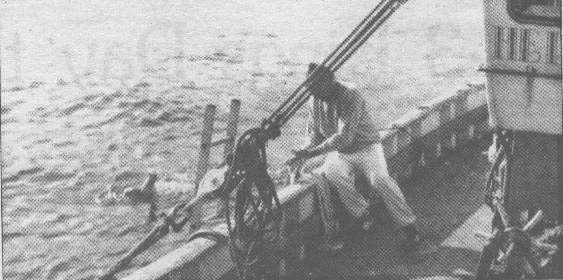
Harry Hauck Sr. encourages his wife, Caroll,
from the
Helen Ann Marie's deck.
The residents of Dover and Folkestone have seen channel
swimmers for
over 100 years, and are very knowledgeable and interested in every
swimmer
who arrives to train in their towns. My family wore matching
sweatsuits,
swimsuits and T-shirts everywhere we went. We carried the Puerto Rican
emblem on our warm-up suits and all the townsfolk wanted to know where
Puerto Rico was, and when we were going to make our attempt. The
family-relay
concept really fascinated them, and they gave us all kinds of advice
and
encouragement.
-
All is confusion now. The Helen Ann Marie has stopped
dead in the
water; the wind is howling; it's so dark I can barely see Harry coming
to the ladder. His hour is up, he swam magnificently, a fast freestyle
for a full hour. He had been told, while I was swimming, that it was
quite
possible that he would be the one to reach France for us during his
turn.
The kids greased him up heavily before he relieved me. He has done a
good
job, they're congratulating him. When Ray hollered down to him that his
hour was up and that we were only 400 meters offshore from France, he
said
he wanted to stay in and finish the relay, so that his mother wouldn't
have to make a second swim, but Ray told him to get out, that his 60
minutes
were almost up, and that his mother must relieve him according to the
rules.
Back in San Juan, we envisioned hundreds of cheering
spectators waiting
on the beach in France when we finally came ashore and finished our
relay.
Historical accounts of the swims of Sir Matthew Webb (first person to
swim
the channel), Gertrude Ederle and Florence Chadwick (the first women to
swim it), tell how whole villages built bonfires and stayed up all
night
waiting to welcome the swimmers.
Once in England, we realized this was the exception and not
the rule.
About 99 percent of successful swims get little or no fanfare. This is
mainly because of the time of day and weather conditions at the finish.
Also, to make headlines you need a good press agent and a lot of
advanced
publicity. We were fortunate in having Fred Rehm, an old friend and
sportswriter
from the San Juan Star, covering our adventure.
-
Reggie has dropped the anchor; the water is too shallow
to go further
shoreward using the big boat. Krista and Jason are helping Caroll with
her cap and goggles and rushing her to the ladder. Because we're at
anchor,
the ship is rolling more than ever. Everyone is falling down. Ray is
putting
a small inflatable rubber dinghy over the side and he and Jason are
going
to guide Caroll through the darkness to shore. There they go,
disappearing
into the night. Only Jason's flashlight shows in the blackness. I'm
worried
about Caroll in this high sea at night.
When Hurricane Charlie hit Dover, I went down to the harbor
with Krista,
thinking that perhaps we could train inside the 12-foot high stone
breakwaters.
I quickly abandoned that idea when I saw sea water pouring over the
tops
of the walls and then roaring wildly across the harbor to crash against
the sea wall and over the boardwalk. It was unsafe to even step out
onto
the beach. I had a quick lesson in how mean and dangerous the channel
can
become.
-
9:30 p.m. Sixth swimmer, second round: Caroll
She's back! Caroll just now climbed up the ladder and
stepped
on deck. She was in the water for 13 minutes. She says she was into the
rocks and surf near shore: not knowing where she was, when Ray Brickel
declared our swim officially completed. Then he and Jason pulled her
into
the rubber dinghy and headed back to the Helen Ann Marie. We're
shouting
and hugging and kissing one another. I'm going to get the large Puerto
Rican flag I brought all the way over just for this moment. I want to
take
some photos of this happy crew. Ray is telling me our official time is
11 hours and 13 minutes, not bad! He and Reggie have the dinghy on
board
now. They're trying to raise the anchor and turn the ship towards
England
before the weather conditions worsen even more. We still have a cold,
rough,
four-hour boat ride back to Folkestone, but nobody cares now. We've
made
history!
On Dec. 18, 1986, the English Channel Swimming Association
officially
ratified the Hauck's relay swim. The swim was properly registered in
the
Channel Swimming Record Book as being done by the first family in
recorded
history to swim the channel "relay style." The official time was listed
as 11 hours and 13 minutes. Since the Haucks listed themselves as a
national
entry from Puerto Rico, the island became the 87th country to complete
a channel swim.
From The San Juan Star Sunday Magazine/ Jan 3, 1988
|
